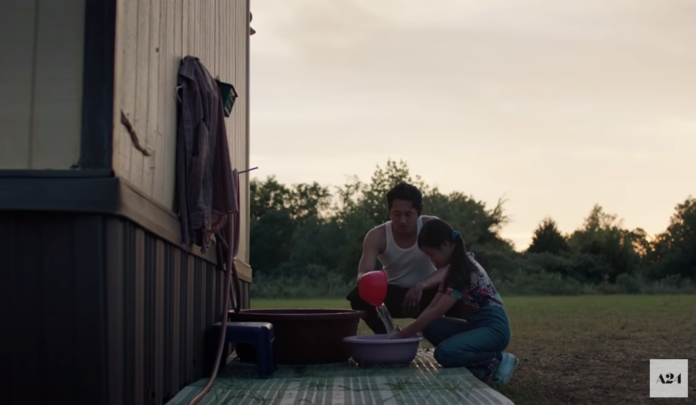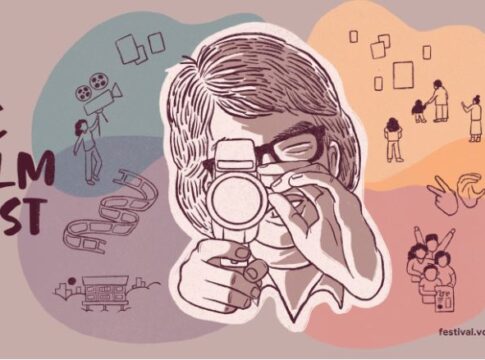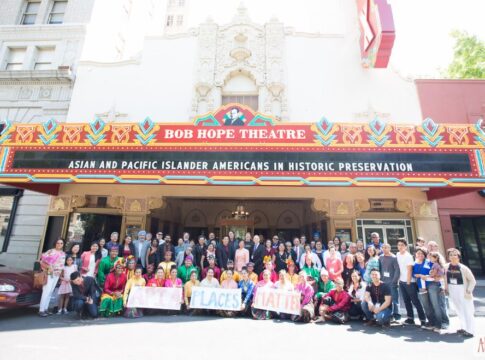A24 Photo
By Jana Monji, AsAmNews Arts & Culture Writer
Minari director Isaac Lee Chung and producer Christina Oh recently shared their journey to the Academy Awards during a recent online interview with journalist Ann Curry.
Chung received nominations for Directing and Original Screenplay and Oh for Best Picture.
Curry noted that Minari had already won a SAG (Outstanding Actress in a Supporting Role in a Motion Picture for Youn Yuh-Jung) and a Golden Globe (Best Foreign Language Film) and is nominated for six Academy Awards (Best Picture, Best Director, Best Original Screenplay, Best Actor, Best Supporting Actress and Best Original Score) before launching into her questions. The questions and answers have been edited.
LATEST STORIES
The 92nd Street Y, a New York based cultural and community center hosted the event just days before Sunday’s Oscar presentation on April 26.
Curry: What compelled you to write this screenplay knowing that it’s the kind of story that rarely ever makes it to the big screen?
Chung: I wasn’t sure I’d have another shot at making a movie. I was going to transition into teaching. And I was always slightly unsure if my story about my growing up, if that was even interesting for an audience, but I felt like if this is going to be the last thing that I worked on, then it might as well be very personal and make something that I would regret if I don’t.
I was thinking about my daughter a lot as well. I hadn’t made a film since she was born and I was trying to think of something that I’d like to make to be able to pass on to her, in a way, something that she could see.
Curry: Is there a word that that best describes how hard it is to get a movie about the Asian American. Asian immigrant experience with subtitles?
Chung: We had so many people who just believed in this film, people coming in on crew, the actors. Because movies like this weren’t necessarily being made, there are many people who just came in and wanted to fight for this film to be made.
I think that’s why we were able to make this for very little money for 25 days, because of that deep passion. It wasn’t just children of immigrants. It was people from rural areas in Oklahoma and Arkansas, who also came on board on this development and said, “This is really their story.”
Oh: Steve (Yeun), and I were talking one day, he mentioned the script. I hadn’t read it. Then when I did (I thought) this very sort of interesting, the authenticity, then having a true emotional connection to the story. I didn’t grow up on the farm or in Arkansas, yet, something compelled me and connected and connected to this family… and my parents, the kind of the hardships that we went through on an emotional level. I wanted to be a part of them, wanted to help and I wanted to create the space for this to exist.
Being a young child and immigrants, a young, female Asian producer, I think, for me, I never want to make something that’s going to put me in a box or like pigeonhole me into a certain category. I think for a long time, I kind of strayed away from those sorts of stories, just because I didn’t want it to seem like I’m doing an Asian thing, just as an Asian, right.
Curry: The subtitles limited how many Golden Globe categories the movie could qualify for? Did that actually, ever, even for a moment make you regret making the movie largely in Korean? Isaac?[This isn’t true. The subtitles did not limit the possibility of actors or directors being nominated. Last year, both Awkwafina and Antonio Banderas were nominated for acting awards in foreign language films, The Farewell and Pain and Glory, respectively. Awkwafina won a Golden Globe. In 2018, Alfonso Cuarón won a Golden Globe for Best Director for the Spanish language Roma. For the year 2000, Ang Lee won Best Director Golden Globe for Crouching Tiger, Hidden Dragon.]
Chung: No. That’s a great question. Because at the very beginning of this process, I kind of had fears that I couldn’t get this film financed because of the fact that this family would be speaking Korean. And I had a version of the script in which the family could speak more English. Once Christina was on board as producer, she really encouraged me by saying, “Hey, you know, the way that we grew up, and the way that Steven Yuen, grew up, all of us grew up in homes in which English is not really spoken, and Korean is spoken. And there’s something realistic to that kind of portrait of our types of families.”
She just encouraged me to go ahead and just make this story as true and authentic as possible. And once I felt that freedom to do that, I felt no regret since then, like I did, when I watched the film, what I see is a reflection of the way I grew up and the way that many of us grew up around in America.
I think the good thing is that I feel like we’re challenging that notion that an American family has to be speaking English within their homes. You know that there’s a certain portrait, there’s a certain image of an American family. And I feel like this film kind of stretches that image a bit.
Curry: You know, we heard something similar to this from the director of Parasite when he said (during his acceptance speech for Best Foreign Language Film at the Golden Globes), “Once you overcome the one-inch-tall barrier of subtitles, you will be introduced to so many more amazing films,” I mean, how do you react with that, quote, Isaac, and based on your own experience? What do subtitles give us a window to?

Chung: Well, you know, when I grew up, I saw no films with subtitles. I grew up in rural Arkansas, just like this family. When I finally got to college, that’s when I started to see films from other countries. And I started to read subtitles, I was opposed to this.
Growing up, I always thought those were probably the most boring films. Once I started to watch films with subtitles it opened me up to different people, different human beings. And you know that that barrier language is often something that keeps us from seeing each other in a way, but once you start to read the subtitles, and you start to understand what people are saying in their own languages, you just realize not only that, you don’t think of people as being different in a way you start to realize that we are so similar.
There’s so much that makes us similar. We have the same pains, we have the same choice. And that was revolutionary for me in college. And that’s what propelled me into going into filmmaking: all these worlds and the films that I was watching. That statement is so wise and I encourage the same.
Curry: I understand that you didn’t even like the minari (Oenanth Javanica or water celery or water dropwort), which is a kind of vegetable?
Chung: I like it now, and when I was a stupid kid growing up, I was mean to my grandma. And I didn’t know. I didn’t mean it. In some ways, (this film) is a way to try to fix those regrets that I have. I like eating it now. But what was important for me as a kid was that experience of going to the creek side with my grandmother, to pick minari. That element from real life is definitely something I tried to preserve in the film. And the feeling that I had just by being with her as she would give me wisdom about life, while we sit by the water, and make this wonderful plan.
Curry: So much of this movie is about relationships, like the way you describe the relationship of a family to the land and relationship of a husband to his wife. A relationship between who they were together in Korea and who they are now in America. And as you’re talking about in relation to a little boy who was born in America, to his Korean grandmother, and I noticed the movie feels like it’s from the boy’s point of view, in some moments. And really, you can almost feel his innocence and confusion in the way you portrayed it and also sometimes even in the camera angles.
Chung: We wanted this film to feel like it’s almost a memory that the boy’s having. That child-like perspective onto this family is, I think, part of what gives the film’s magic. The fact that it’s the eyes of innocence, that are kind of watching the parents and the parents watching the grandmother. It’s a coming of age story in many ways for this little boy and he offers that coming of age for us as an audience. Family stories are love stories and immigration stories are love stories. This story is meant to work on that level and I wanted it to be a little boy that’s watching.
Curry: Interestingly, the grandmother, comes off as not at all like American grandmothers and eventually feels exactly like grandmothers everywhere. Isaac, how much of that was intentional?
Chung: I wanted to feel like this grandmother almost invades this family with a whole different way of doing things, of looking at life. But ultimately, I wanted her to be someone who ushers in a type of rebirth into this family. And she does it through through love. And I think that’s what, in my own life I experienced with my grandmother. And what I noticed with my mom and my wife’s mother. I think grandparents are very special and they hold a special place in my heart.
Curry, after showing a clip from Minari,: Given all that leads to these two characters reaching this moment, it’s notable how restrained layer these performances are. What do you have to say about this moment?
Chung: There’s a lot of that idea of economics that plays into a lot of struggles that we have in relationships in this country. And it’s something that I was even wondering in my own life about. As I was watching the scene, I was just impressed so much with them again. I gave them that direction that a lot of this film has to be told through their faces, through their gestures, have you feel like that we have to invite people in through emotional performances. They did it by inhabiting those roles in those situations, by not overplaying things, but simply by, feeling those things.
Curry: Isaac, having myself grown up in that way as Asian in a small town, in America, you could see a lot of confusion and curiosity in the people and the local people. At the same time, I was thinking, every Asian American I know, including myself, has experienced, direct overt racism. And, I’m imagining that both you, Isaac and Christina, have as well. So, one thought I wanted to ask you about is why did you thread so carefully on the subject of race in this movie? There’s a kind of delicacy in which you handle this very tough subject.
Chung: I do feel as storytellers we have quite a responsibility in the types of narratives we’re putting out there about these issues. I felt it would be irresponsible, if I don’t address it at all. I felt it’d be irresponsible if I tried to make a point at the expense of anyone. What I’m planning to do with this one is try to have some optimism and express the memories that I have that that show maybe something counterintuitive, something impossible happening, which is bridging gaps, bridging connections. That little boy you see in the film. at church, he hears an insult from a White boy, and then, they quickly become friends. This kind of reflects the situation in my own life. I remember growing up, there was a kid named Johnny, who I became really good friends with and he, in the very beginning, he was just very curious about me. He never seen an Asian kid before. So he would ask me stupid questions, I’ll be honest, but we became best friends.
Curry: I know that you’ve have worried Isaac, about what your family and your friends might think about filming as you’re talking about it with what was real and what wasn’t. And it seems to me to be extremely respectful, because these people are still around, but I’m thinking that, nevertheless, you have to have been very nervous.
Chung: I was so nervous about it that I didn’t tell them anything. They all thought I was doing some kind of tale in which I air all the dirty laundry of our family because I was so nervous. And I wouldn’t say anything, because I simply didn’t know how they would respond. I think the good thing about that was that their expectations were so very low. I think they felt relief, like, “Okay, this is not a terrible.” I noticed they started to feel very moved by the end. At one point, then we just look at how far we’ve gone. We started out there in that trailer home. Look at where we are and we’re still together. The film can offer that for us, a reflection of just what we suffered through, what we were able to overcome.
Curry: Minari is nominated for Best Picture, Best Original Screenplay, Best Director, Best Actor, Best Supporting actors and Best Original Music Score, musical score. And so then beyond that, it has broken ground for Asians in Hollywood, Isaac.
Chung: I hope that this one just opened the doors for people.
Oh: We just wanted to make a movie. But it’s been it’s been a crazy, humbling event, an amazing ride.
92Y was founded in 1874 by a group of German Jewish professionals and businessmen to serve the needs of the American Jewish community in New York City as the Young Men’s Hebrew Association. By 1900, the organization moved to 92nd and after World War II was reorganized as the Young Men’s and Young Women’s Hebrew Association. At its current location since 1930, the 92nd Street Y promotes individual and family development and participation in civil life within the context of Jewish values and American pluralism and reaches beyond its core constituency of American Jews to serve people of diverse racial, religious, ethnic and economic backgrounds.
AsAmNews has Asian America in its heart. We’re an all-volunteer effort of dedicated staff and interns. Check out our new Instagram account. Go to our Twitter feed and Facebook page for more content. Please consider interning, joining our staff, or submitting a story or making a contribution.








